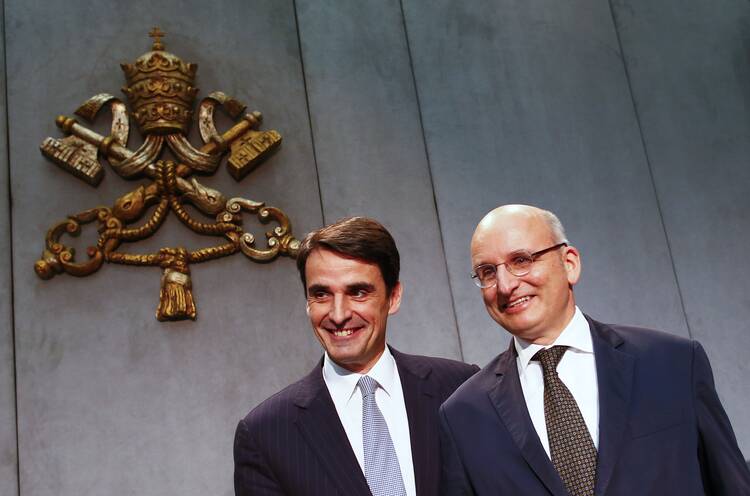Revamping God’s Bank
Ridding the beleaguered Vatican Bank of the occasional scandal is not enough for Cardinal George Pell, the new prefect of the Secretariat for the Economy appointed by Pope Francis to lead the reform efforts. “Our ambition is to become something of a model for financial management,” the Australian prelate told a packed press conference held on July 9 to unveil the latest measures in the overhaul of Vatican finances.
The entire governing board of the bank will be replaced as the French business executive Jean-Baptiste de Franssu takes over as the new director. In addition, the Financial Information Authority, the Vatican’s financial watchdog, has entered into an agreement with the U.S. Treasury Department’s Office of the Comptroller of the Currency, an independent bureau that oversees the regulation and supervision of all domestic and foreign banks operating within the United States. The two bodies will exchange information about regulatory best practices and protocols as part of the Holy See’s ongoing efforts to achieve greater financial accountability and transparency.
In an exclusive interview with America, Cardinal Pell said, “The exact relationship between the international expert lay people and the cardinals [overseeing the bank] has yet to be completely worked out…. We will be attempting to devise a system so we cannot fall back into the old ways.” The new system must not only provide safeguards against corruption but also build up a culture of effective cooperation—between prelates and lay employees as well as the Vatican and international financial institutions. Only then will the Institute for the Works of Religion, as the bank is formally known, live up to its name.
Rapprochement in Vietnam
It is safe to say that relations between the government of Vietnam and that nation’s Catholic Church have been far from cordial in recent years. Even as Vietnamese authorities have explored China-style economic experiments aimed at poverty reduction and improvements in living standards, they have retained many repressive tendencies typical of Communist authoritarian rule, especially in regard to religious liberty. Conflict over reclaiming confiscated church property has also been a regular obstacle to improved relations between the state and the church.
What may prove to be a small sign of better days ahead is the anticipated approval of the construction of Vietnam’s first Catholic university. With headway made toward a green light from government officials, church authorities there say the institution could be completed within a year. Paul Bui Van Doc, archbishop of Ho Chi Minh City, told Vatican Insider that this agreement indicates his “dialogic approach” with Vietnamese authorities is beginning to bear fruit. The church has been locked out of Vietnam’s tightly controlled education system for decades, but this new opening will allow it to construct an institution that can “educate people into becoming responsible individuals, for the good of the entire society,” Archbishop Bui Van Doc said. “We are confident. It will mark an important step forward for the common good of the country, a sign of great hope for a brighter future for Vietnam,” he added.
With about 7 percent of the population—six million people—Catholics represent a significant minority in Vietnam; their full participation in Vietnamese society could have an important impact on improving social conditions. A new, Catholic institution of higher learning makes a promising start.
The Rebirth of Detroit?
It has been over a year since the city of Detroit first filed for bankruptcy on July 18, 2013, and much has been written on the hows and whys of the Motor City’s downfall. The month following the bankruptcy claim, America’s chief correspondent, Kevin Clarke, travelled to Detroit to document the challenges the city faced, as well as the resiliency of those who call it home. His conversations with residents made clear that two things, money and jobs, were most needed for this once great American city to rise up. He also asked the question many Americans were asking at the time: Can this city be saved?
A recent piece by The New York Times describes various factors contributing to Detroit’s possible return, beginning with the real estate purchases made by Dan Gilbert, founder of Quicken Loans. According to the Times, Mr. Gilbert has purchased more than 60 downtown Detroit properties and nine million square feet of prime real estate. Money being invested back into the city from various foundations, like the Kresge Foundation, an organization based in Troy, Mich., is another sign of urban revival. These developments have started contributing to what the Times describes as a “boom of small businesses and the new retail and real estate activity going on outside the city center.”
While Detroit’s journey is far from over, these factors demonstrate that there is hope for a fallen city. And, a year later, we ask again, can this city be saved? The answer appears to be yes, slowly but surely.








